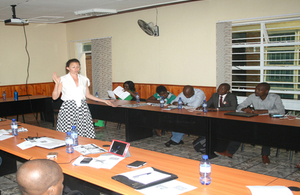UK for enhanced journalism standards in Malawi
Raphael Tenthani Centre for Media Excellence to be used for regular convening, training, mentorship and research launched

A workshop on investigative journalism taking place at the centre
Another milestone in the UK-Malawi partnership focusing on education and building a vibrant media was reached on Tuesday following the inauguration of a media centre that will facilitate regular convening, training, mentorship and research by media practitioners in Malawi.
Situated in Blantyre within the department of Journalism at the Polytechnic, a constituent college of the University of Malawi, the Raphael Tenthani Centre for Media Excellence, named after an iconic Malawian journalist Raphael Tenthani who until his death in a car crash on 16 May 2015 was a Malawian correspondent for the British Broadcasting Corporation (BBC), was officially inaugurated by the British High Commissioner to Malawi Simon Mustard alongside the Vice Chancellor of the University of Malawi Professor John K Saka.
A three-day workshop on investigative journalism that drew 20 journalists from different media houses in Malawi marked the launch and this was followed by a seminar for media lecturers and senior newsroom personnel to discuss ideas that can enhance journalism standards in Malawi. Apart from sponsoring the two initial workshops, The UK government also supported the refurbishment of the training room.
The department of journalism at Polytechnic, in line with its mission to be the leading media research and training institution in Malawi and the region, plans to use the centre for regular convening, training, mentorship and research to develop and nurture modern and skilled journalists that deliver better outputs for the strengthening of Malawi’s nascent democracy.
The British High Commissioner to Malawi Simon Mustard said the changing times both locally and internationally call for journalists to be better equipped to deliver timely, relevant, and well-researched stories that benefit the populace to make informed decisions.
“The media in Malawi is doing a commendable job to hold politicians, businesses, civil society and local leaders to account. But there is always room to do more in your democratic duty to inform the citizens by adapting to the challenges posed by new media and a more demanding audience,” said Mustard.
He expressed hope that the creation of the centre would facilitate continuous reflection by members of the media of their outputs and building of capacity in different strands of journalism for the benefit of Malawi’s general public.
For his part, vice chancellor of the University of Malawi Professor John D Kalenga Saka said the setting up of the centre was consistent with the university’s strategic plan on research, outreach and community engagement, and core value responsiveness.
“Strengthening quality of teaching and learning requires adequate and well-furnished teaching and reference laboratories. This centre will thus enhance students’ practical experience in the university as this centre will be used for research seminars and professional development activities such as mentorship, interaction, discussions, debates, networking and engaging the media industry for discussions,” said Saka.
The UK has been a long-standing supporter of Malawi media since the dawn of multi-party democracy.